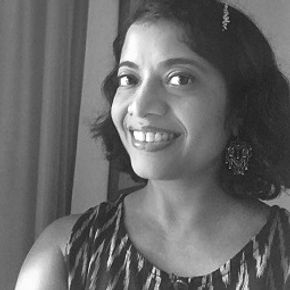Jonaki Ray
the poet
Jonaki Ray is a poet, writer and editor based in New Delhi. She won the 2019 Iceland Writers Retreat Alumni Award, and was nominated for both the Pushcart Prize and the Forward Prize for Best Single Poem. Jonaki's writing has appeared in several publications, including The Rumpus, Indian Literature, Southword Journal, Cha, and Best Indian Poetry 2018. She is the author of Lessons in Bending, and her debut collection is Firefly Memories.
the poems
Kaemon Accho? Shob Thik?
This was a refugee market once, and now, more than fifty years after they were displaced
the red-and-white saris, the Desh magazines, the nolen gur sandesh dot
the shops, proclaiming the Bangla majority on the pavements and the streets.
Yet, at the corner, the tarpaulin-covered fish market spatters with
Bangla, Hindi, Oriya, Ahomiya, Bhojpuri, Manipuri, and more,
reflecting the origin of the fish piling up the plastic-lined tables of the stalls.
Mackerel from Karnataka and Pomfret from Maharashtra flash silver, their kite-like bodies
quivering the ice underneath; the fishermen pull out black thread like veins
from the brownish-grey jumbo prawns from Orissa—“Eita bish, bhoojle didi”
while the shovel-like Rohus are haggled over mostly by the Bengalis.
“Eikhan kar lok prefer boneless fish such as Surmai”, sneers Dulal’s grandson,
as if not wanting to search for flesh tearing through thousands of needle bones
reflects a lack in the people who belong here—the here that remains different from home.
Dulal’s shop is the oldest—forty years and more—
and the only shop with the “Eikhane Bangladesh-er Padma Ilish Paya jaye” sign.
Grandfather would have bought the Ilish—
not wincing at the 1200 rupees per kilogram price—a true Bengali doesn’t
count money when buying Ilish—he used to say. But grandfather is gone, and so is Dulal.
Now, his grandson jots down the day’s purchases in a notebook that seems to reflect
the blood of the fish dripping down the tables into the water tanks under them.
I buy my usual Sunday stock—250 grams of Rohu and 250 grams of the silverfish
resembling Morella—a measly total of Rupees 220, and nod at Dulal’s grandson
--Aashi—there is no word for goodbye in Bangla; instead I tell him I'll come (again).
I'm already dreaming of marinating
the pieces in salt and turmeric
and frying them crisp in smoky mustard oil—
the simplest of recipes that has traveled down
from grandfather to me—in the same way that he did—from Burma
to Bangladesh to India—just like these fish.
Kaemon accho? Shob thik?: How are you? All well?
Desh: Country (a popular Bengali magazine)
Nolen gur sandesh: Sweets made of milk and palm jaggery
Eita bish, bhoojle didi: This is poison, do you understand, elder sister
Eikhan kar lok: The people here
Eikhane Bangladesh-er Padma Ilish Paya jaye: Hilsa from the Padma river in Bangladesh is available here
Ilish: Hilsa
Aashi: I’m coming (a way of saying goodbye)
On the road leading away from Florence,
a woman is screaming at a man with a Picasso face.
Shaking his head and half-shutting the door,
he walks inside the house,
leaving her alone at the stoop, smoking.
She's trembling like the skeleton
of a snail being picked clean by a colony of ants.
The driveway leads to a gate
and a child is attempting to swing it open,
his face a smeared version of a Botticelli angel.
Old men in Kolkata, reading newspapers, smoking,
and solving the world’s problems
are facsimiling in the suburbs of this city,
while Cypress trees' fingers point skywards, apportioning blame.
Buttery light pouring over miles of yet-to-be-harvested farms
with stakes at their hearts dusks the days to evenings.
In Montefioralle, a woman named Margherita offers me
a gooseberry-colored plum, while her husband tugs
at her attention like clothespins before a thunderstorm.
I'm back in the city that led a crushed Independence Mutiny,
failing with my mother in convincing my father
to let her go for a conference, alone.
Who will take care of everything,
he asks, even now,
a dozen years after her dying.
Eating Water Living Tales
Parboti Ma, front teeth missing
back teeth always chewing betel nuts
hands busy sweeping floors, stoking the stove
kneading the flour, sieving the curdled milk
into sondesh sweetened with gur,
or roshogollas steeped into sugar syrup,
tagged as ‘a hocche bangali’, for the hocche, hai
she added to every line, dipping from Hindi to Bangla.
Parboti Ma, happy to cook for Khoka Babu
my father—fish and mutton, flavored with garlic and onion,
food she herself was banned from eating,
laughing at herself “Paani Khana hai” (I want to eat water)—
dipping from Bangla to Hindi.
Parboti Ma, refugee from Bihar, worker in Kolkata, resident of Delhi
teaching me, “Stay still, just like the teeter-totter in the playground,
and one day, balance will come to you.”
Hai: Is
Publishing credits
Eating Water Living Tales: The Sunflower Collective
Kaemon Achho? Shob Thik?: The Margins (Asian American
Writers' Workshop)
Memory Talkies: winner of the Oxford Brookes University
.png)
